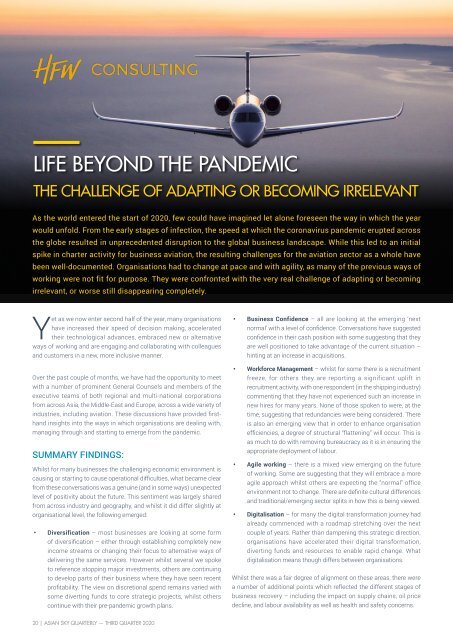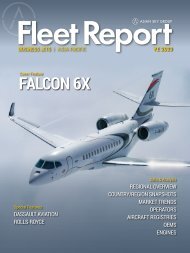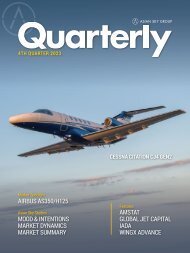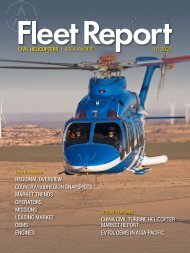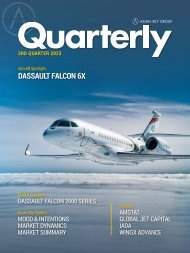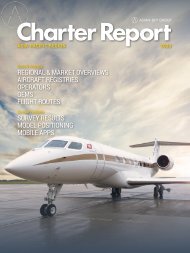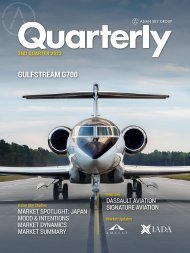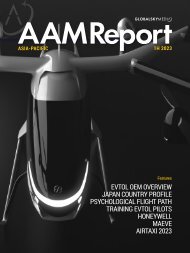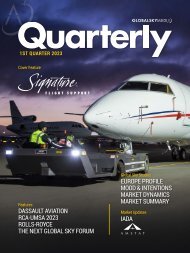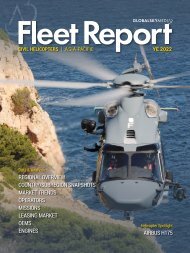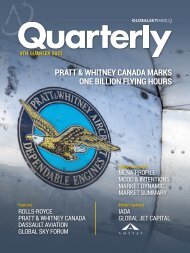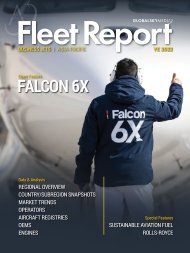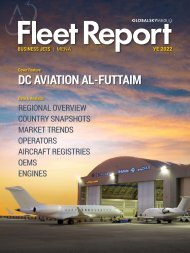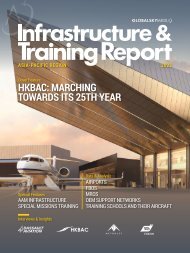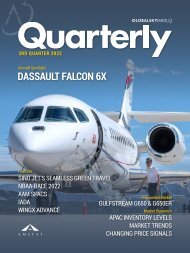You also want an ePaper? Increase the reach of your titles
YUMPU automatically turns print PDFs into web optimized ePapers that Google loves.
LIFE BEYOND THE PANDEMIC<br />
THE CHALLENGE OF ADAPTING OR BECOMING IRRELEVANT<br />
As the world entered the start of <strong>2020</strong>, few could have imagined let alone foreseen the way in which the year<br />
would unfold. From the early stages of infection, the speed at which the coronavirus pandemic erupted across<br />
the globe resulted in unprecedented disruption to the global business landscape. While this led to an initial<br />
spike in charter activity for business aviation, the resulting challenges for the aviation sector as a whole have<br />
been well-documented. Organisations had to change at pace and with agility, as many of the previous ways of<br />
working were not fit for purpose. They were confronted with the very real challenge of adapting or becoming<br />
irrelevant, or worse still disappearing completely.<br />
Yet as we now enter second half of the year, many organisations<br />
have increased their speed of decision making, accelerated<br />
their technological advances, embraced new or alternative<br />
ways of working and are engaging and collaborating with colleagues<br />
and customers in a new, more inclusive manner.<br />
Over the past couple of months, we have had the opportunity to meet<br />
with a number of prominent General Counsels and members of the<br />
executive teams of both regional and multi-national corporations<br />
from across Asia, the Middle-East and Europe, across a wide variety of<br />
industries, including aviation. These discussions have provided firsthand<br />
insights into the ways in which organisations are dealing with,<br />
managing through and starting to emerge from the pandemic.<br />
SUMMARY FINDINGS:<br />
Whilst for many businesses the challenging economic environment is<br />
causing or starting to cause operational difficulties, what became clear<br />
from these conversations was a genuine (and in some ways) unexpected<br />
level of positivity about the future. This sentiment was largely shared<br />
from across industry and geography, and whilst it did differ slightly at<br />
organisational level, the following emerged:<br />
• Diversification – most businesses are looking at some form<br />
of diversification – either through establishing completely new<br />
income streams or changing their focus to alternative ways of<br />
delivering the same services. However whilst several we spoke<br />
to reference stopping major investments, others are continuing<br />
to develop parts of their business where they have seen recent<br />
profitability. The view on discretional spend remains varied with<br />
some diverting funds to core strategic projects, whilst others<br />
continue with their pre-pandemic growth plans.<br />
• Business Confidence – all are looking at the emerging ‘next<br />
normal’ with a level of confidence. Conversations have suggested<br />
confidence in their cash position with some suggesting that they<br />
are well positioned to take advantage of the current situation –<br />
hinting at an increase in acquisitions.<br />
• Workforce Management – whilst for some there is a recruitment<br />
freeze, for others they are reporting a significant uplift in<br />
recruitment activity, with one respondent (in the shipping industry)<br />
commenting that they have not experienced such an increase in<br />
new hires for many years. None of those spoken to were, at the<br />
time, suggesting that redundancies were being considered. There<br />
is also an emerging view that in order to enhance organisation<br />
efficiencies, a degree of structural “flattening” will occur. This is<br />
as much to do with removing bureaucracy as it is in ensuring the<br />
appropriate deployment of labour.<br />
• Agile working – there is a mixed view emerging on the future<br />
of working. Some are suggesting that they will embrace a more<br />
agile approach whilst others are expecting the “normal” office<br />
environment not to change. There are definite cultural differences<br />
and traditional/emerging sector splits in how this is being viewed.<br />
• Digitalisation – for many the digital transformation journey had<br />
already commenced with a roadmap stretching over the next<br />
couple of years. Rather than dampening this strategic direction,<br />
organisations have accelerated their digital transformation,<br />
diverting funds and resources to enable rapid change. What<br />
digitalisation means though differs between organisations.<br />
Whilst there was a fair degree of alignment on these areas, there were<br />
a number of additional points which reflected the different stages of<br />
business recovery – including the impact on supply chains, oil price<br />
decline, and labour availability as well as health and safety concerns.<br />
20 | ASIAN SKY QUARTERLY — THIRD QUARTER <strong>2020</strong>


